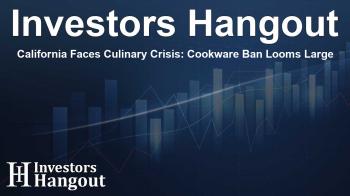California Faces Culinary Crisis: Cookware Ban Looms Large

California's Proposed Cookware Ban: A Threat to Freedom of Choice
The California legislature is preparing to vote on a contentious bill that has stirred much debate among residents. The proposed legislation aims to ban the sale of non-stick cookware and corded kitchen appliances across the state. If enacted, this ban could drastically limit the cookware options available to consumers, causing economic repercussions for many families and businesses.
The Impact of SB 682 on Households and Local Businesses
The potential consequences of this ban are substantial. For families, replacing non-stick cookware could lead to an average increase of $300 per set, a severe financial burden for many households. Furthermore, restaurants, which are still recovering from the effects of the pandemic, may face crippling costs associated with replacing essential cooking tools, in turn affecting local economies.
Job Losses and Economic Downtime
California's expansive food industry, which includes over 110,000 restaurants and about 1,000 food trucks, relies heavily on non-stick cookware for daily operations. The nationwide cookware sector, valued at approximately $2.5 billion, supports countless jobs across various industries, including manufacturing, distribution, and retail. A ban like SB 682 could put an estimated 6,500 jobs at risk and negatively impact port operations critical for the transportation of goods.
The Environmental Consequences
In addition to its economic impact, the ban could contribute to an increase in landfill waste. Millions of pots and pans would likely be discarded as consumers transition to new cookware options, thereby straining California’s waste management systems. The environmental implications are concerning, considering the state’s ongoing efforts to promote sustainability.
Addressing PFAS Concerns with Balanced Solutions
At the core of this legislative push is the concern surrounding PFAS, a group of chemicals utilized in various consumer products, including non-stick cookware. However, many experts argue that the broad classification of all PFAS as hazardous is an oversimplification. Certain fluoropolymers, like polytetrafluoroethylene (PTFE), are deemed safe by reputable authorities such as the U.S. Food and Drug Administration. These materials are not only non-toxic but also do not accumulate in the body or dissolve in water, making them suitable for everyday kitchen use, including in medical devices.
A Call for Collaboration and Reason
Leaders within the Cookware Sustainability Alliance (CSA) are advocating for a collaborative approach to address PFAS concerns without resorting to drastic measures like a full ban. CSA emphasizes the importance of informed consumer choices grounded in scientific research rather than political motivations. The organization urges lawmakers to consider balanced solutions that prioritize both consumer safety and environmental integrity.
Importance of Common Sense Regulation
In the words of CSA President Steve Burns, "The proposal could drastically alter California kitchens and may inadvertently increase costs for families and local businesses while generating unnecessary waste." The call is clear: legislators must work together to find practical measures that target genuine risks without undermining safe products that many depend on daily.
Frequently Asked Questions
What is SB 682?
SB 682 is a proposed bill in California that seeks to ban the sale of non-stick cookware and corded kitchen appliances, raising concerns among consumers and businesses.
How would this ban affect household costs?
If passed, households may face an average increase of $300 when replacing non-stick cookware, putting financial pressure on many families.
What are the job implications of this bill?
The proposed ban could lead to significant job losses, with an estimated 6,500 jobs at risk across California’s food service industries.
What are PFAS, and why are they a concern?
PFAS are a group of chemicals found in various products, including non-stick cookware. The broad categorization of all PFAS as harmful lacks nuance and could be misleading.
How can consumers make informed decisions about cookware?
Consumers are encouraged to seek information on the safety of cookware products from reliable sources and consider evidence-based research regarding materials used in their cookware.
About The Author
Contact Lucas Young privately here. Or send an email with ATTN: Lucas Young as the subject to contact@investorshangout.com.
About Investors Hangout
Investors Hangout is a leading online stock forum for financial discussion and learning, offering a wide range of free tools and resources. It draws in traders of all levels, who exchange market knowledge, investigate trading tactics, and keep an eye on industry developments in real time. Featuring financial articles, stock message boards, quotes, charts, company profiles, and live news updates. Through cooperative learning and a wealth of informational resources, it helps users from novices creating their first portfolios to experts honing their techniques. Join Investors Hangout today: https://investorshangout.com/
The content of this article is based on factual, publicly available information and does not represent legal, financial, or investment advice. Investors Hangout does not offer financial advice, and the author is not a licensed financial advisor. Consult a qualified advisor before making any financial or investment decisions based on this article. This article should not be considered advice to purchase, sell, or hold any securities or other investments. If any of the material provided here is inaccurate, please contact us for corrections.

